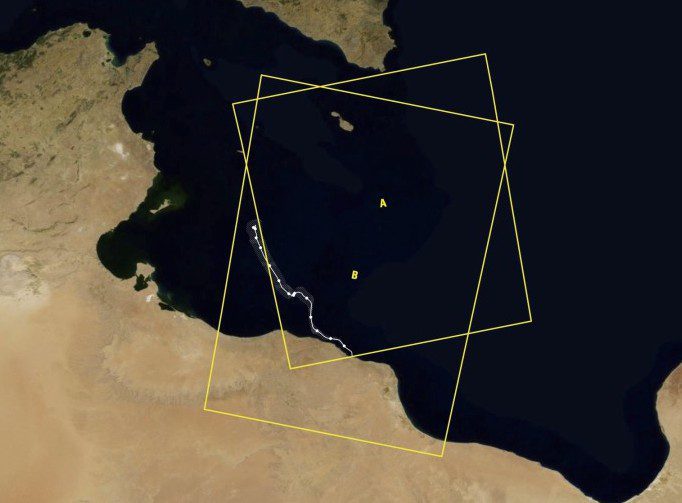Haus der Kulturen der Welt (HKW), Berlin, Germany
15 Mar 2014 - 05 May 2014

Forensis | Synthetic aperture radar satellite imagery (A and B) showing the 'left-to-die' boat’s drift trajectory | © Charles Heller, Lorenzo Pezzani and Situ Studio, Forensic Architecture (ERC)
How do mortal remains, DNA samples, and satellite images become forensic evidence? What role do imaging techniques and methods of representation play in the investigation of crimes or political acts of violence? How are objects made to speak?
From tracing fingerprints to tracking Internet activities, forensics is central to the ways by which states police and govern their subjects.
Through its media representations it has also become a defining feature of contemporary culture. Forensis seeks to invert the direction of the forensic gaze and designate the emergence of new aesthetic-political practices by which individuals and independent organisations use new technologies aesthetic practices, and architectural methodologies to bear upon a range of issues from political struggle to violent conflict and climate change.
Exhibition
The exhibition presents the work of the Forensic Architecture project at Goldsmiths, University of London. It includes the presentation of of forensic investigations — involving imaging processes, satellite images, 3D visualizations, models and videos — were mobilised as evidence on behalf of prosecution teams, civil society organizations, activists, human rights groups, and the United Nations. These contemporary forensic practices are situated within broader political, recorded and presented, and tests the potential of new types of evidence to expand our juridical imagination, open up forums for political dispute and practice, and articulate new claims for justice.
Curated by Anselm Franke and Eyal Weizman.
Opening: Friday 14.03.2014 , 6pm
Conference
The opening of the exhibition will be marked by the conference: ‘The Architecture of Public Truth’
2014, Saturday, March 15 – 2014, Sunday, March 16
The conference will present the most impressive research projects and legal cases in talks, screenings, and discussions. Around the themes “Forums,” “Forensic Architecture,” “The Forensics of the Anthropocene,” and “Drift,” artists, architects, filmmakers, and activists will offer insights into their work and provide an overview of the artistic and political activities that arose at Goldsmiths in the context of the project forensic architecture. Discussions with prominent practitioners of international and human-rights law will explore how new forms of argumentation can change our conception of international law.
The list of participants includes, among others, author Jonathan Littell (“The Kindly Ones,” French: “Les Bienveillantes”), Luis Moreno Ocampo, first Prosecutor of the International Criminal Court in The Hague, Baltasar Garzón, Spanish human rights investigator who indicted Augusto Pinochet, Michael Sfard, Israel’s most prominent human rights lawyer, and human rights lawer Wolfgang Kaleck, who has recently submitted a criminal complaint to the International Criminal Court on “abuse” by UK forces in Iraq.
Program:
Saturday 15.03.2014
14:00
Forensis: Cases and files
Guided tour through the exhibition with the participants of the projects
Conference
18:00
Anarchists Against the Law
Michael Sfard in conversation with Susan Schuppli
Conversation
18:45
From Chechnya to Syria
Jonathan Littell in conversation with Eyal Weizman
Conversation
20:00
Keynote: Luis Moreno Ocampo
Conference
Sunday 16.03.2014
13:00
Keynote: Baltasar Garzón
Conference
15:00
Forensics and Human Rights Abuse
Wolfgang Kaleck in conversation with Anselm Franke
Conversation
16:30
Forensics in the Anthropocene
Presentation and Discussion
FORENSIS is a co-production by Haus der Kulturen der Welt, funded by the Capital Cultural Fund, and by Forensic Architecture, ERC-funded research project based at Goldsmiths, University of London. www.forensic-architecture.org
In the framework of The Anthropocene Project